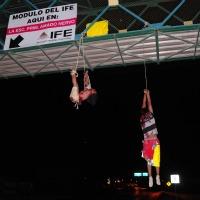[MUSIC UP AND UNDER]
BROOKE GLADSTONE:
Last week the mutilated bodies of a man and a woman were found dangling from a pedestrian overpass in the Mexican border town of Nuevo Laredo. Discovered with the bodies were two notes explicitly warning that those who post the wrong things online will share the same fate.
It's unclear if the authorities have identified the bodies but the message is clear. The cartels are on to social media and their new role as information aggregators in Mexico's drug wars.
For years reporters who dared touch the cartels were threatened and killed. Last year after a photographer for the leading Ciudad Juarez newspaper El Diario was killed in his car for getting too close to the drug war.
After that Editor Gerardo Rodriguez wrote a front page editorial titled, “What do you want from us?” pleading for, quote, “a truce” because we don't want them to kill any more of our campaneros.
Here's what he told us:
GERARDO RODRIGUEZ:
We - we recognize that they are the authority in town because the authorities are non-existent. The cartels are not just criminal, you know, Sometimes they’re politicians. We’re recognizing this fact, which everybody talks about in Mexico, but is not published very often.
BROOKE GLADSTONE:
Recently blogs and Twitter feeds have rushed in to fill the information void, hence the murders last week.
Louis Nevaer has written on the subject for New America Media and joins us from Merida, Mexico. Welcome to the show.
LOUIS NEVAER:
Thank you for having me.
BROOKE GLADSTONE:
As you heard, the El Diario editor had issued a cry of the heart, so where has that left the coverage of the cartels?
LOUIS NEVAER:
What the editor in Ciudad Juarez was talking about was the phenomenon of the cartel’s and their ability to intimidate traditional media, which in many parts of Mexico, if not most of the country, basically relinquishes authority and just doesn't cover the drug wars. They cover violence - so many bodies were found here, this incident happened there.
But they don’t do investigative reporting in the sense that they go out there and try to figure out what's going on.
BROOKE GLADSTONE:
Now, since social media allows for greater anonymity, It's been able to fill some of that gap in coverage, right?
LOUIS NEVAER:
Right because what’s emerging is that people are in some ways inspired by the Arab Spring or other phenomena throughout the world where people can communicate effectively through Twitter and FaceBook to inform and rat out drug cartels and their activities by posting messages such as the suspicious activity in this house that’s suspected of being a safe house.
And with these kinds of messages that are being aggregated through Twitter and other forms of social media, the authorities are actually being able to get intelligence.
And you’re seeing it along the border, and you’re seeing it in Monterrey, in Veracruz. You know, if there are 60 postings about a suspicious house in this neighborhood, that then gives the authorities and intelligence officials an idea of what areas are being used as safe houses or things of that nature.
And so basically, unlike other areas of the world where social media is used to organize against a government, which is what we've seen all year in the Middle East, here people are actually using the social media to defend the principle of government rule.
BROOKE GLADSTONE:
So the cartel wants the public to assume that the bodies of the man and the woman hanging from the bridge last week were bloggers or users of social media. Has there been a reaction online to this gruesome attack?
LOUIS NEVAER:
There really has been no change. In fact, there’s been an increase in social media chatter since it happened and people being very, very defiant about it, saying, we're taking back our country. This is our country and we’re taking it back from the narcos and we’re not gonna stop posting online.
I mean, it's easy to intimidate a reporter or a public official. But how do you intimidate 35 million people who are online and can just post anonymously anything that they want to?
The only way that this is going to stop, I think, is if the cartels can figure out a way of bringing down the Internet in Mexico and paralyzing Twitter or FaceBook. Perhaps a dedicated server attack or some other technological means. But as long as anybody can post on Twitter, it just shows you how technology and how civic participation can change the dynamics of a situation.
I mean, here, for example, 11 years ago Mexico was a one-party country. And now if you had told somebody 11 years ago that in 2011 the president of the country will be from one party, most of the government would be from different parties and the mayor of Mexico City would be from a third party, they would have laughed, saying that that’s crazy. Democracy has become rooted in this country in very interesting ways.
BROOKE GLADSTONE:
Are you suggesting that social media has led to a more genuine and functional democracy in Mexico?
LOUIS NEVAER:
Or I think that a more rigorous democracy in Mexico has empowered social media, so that when the newspaper reporters, television reporters are a little bit intimidated, the civic body itself is prepared to step in and pick up the slack.
BROOKE GLADSTONE:
Louis, thank you very much.
LOUIS NEVAER:
And thank you.
BROOKE GLADSTONE:
Louis Nevaer writes for New American Media.
[MUSIC/MUSIC UP AND UNDER]

